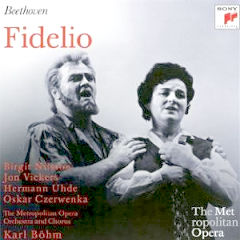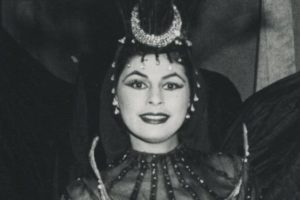
When a new production of Fidelio premiered at the Met in 1960, the opera had been absent from the repertoire since 1951, the post-war return of Kirsten Flagstad as a still effective Leonore and led by Bruno Walter. In the period between the two productions a new generation of singers had begun to make their very significant mark on this repertoire. As part of its new series of Met broadcast CDs, Sony has released
the February 13, 1960 performance with a cast headed by Birgit Nilsson and Jon Vickers with Karl Böhm at the helm. It was a new era for this classic work and while is not a perfect performance, it is certainly one worthy of the house in which it was performed.
Böhm gets things off to a rousing start with the Fidelio overture. His tempi throughout sometimes veer towards the hectic and while it is often exciting, it comes perilously close to bombast. The singers generally manage it well, but the orchestra is not as cohesive and the horns occasionally run into trouble (as a bonus we get the Leonore No. 3 Overture before the final scene.) The Met Chorus acquits itself acceptably although the opening of the Prisoner’s chorus is a bit mushy.
The cast is a solid one, with a few performances that rise to greatness. One might take exception to Charles Anthony’s bumptious Jacquino, which is short on art if not voice. On the other hand it clearly underlines why Laurel Hurley’s charming Marzelline would prefer Fidelio to him. Oscar Czerwenka’s Rocco is characterful with a pungent if somewhat undersized bass and while his singing is not as luxurious as some recent Met exponents (Pape and Moll come to mind) it is never less than efficient. As I write this I heard the sad news of Giorgio Tozzi’s passing and while Don Fernando is not a role to exhibit his strongest qualities it is a positive and well-sung portrayal.
To this point the performance is a good one but what brings the afternoon closer to greatness are the three principals. Without the vocal weight of some of his predecessors—Paul Schoeffler comes to mind—Hermann Uhde projects a truly malevolent Pizarro without resorting to hectoring or blustering. He manages to sing the role beautifully, while projecting the character’s requisite venom with effectiveness.
Vickers’ Florestan is somewhat more restrained than I expect from him but all the more effective for it. He conveys the regret and recollection of “In des Lebens Frühlingstagen” inwardly, contrasting it movingly with the desperation of the final hallucination that closes his aria. The vocal hurdles seem to offer no challenges to Vickers and when Florestan is reunited with Leonore, “O namenlose Freude” is the ultimate expression of their collective joy (without sounding chaotic as it sometimes can.) Only in the tessitura of the final scene do I sense a bit of discomfort.
Leonore was not a role that figured largely in Birgit Nilsson’s Met career. She sang it on only eight occasions overall and in this season she was in the cast only for the broadcast, with the balance of the performances (including the premiere) going to Aase Nordmo-Lövberg. Yet if there was lack of rehearsal it is not evident this afternoon. It is a sovereign portrayal. She manages the awkward tessitura expertly, although occasionally we sense the careful attention to the lower register, which is not one of her voice’s strengths. The top is its glory however and here she does not disappoint.
Throughout her vocal characterization belies the canard that she was all steel and not emotive as a vocal actress. From her first vocal entrance in “Mir is so wunderbar” (finely matched to her colleagues) to the final scene, this Leonore is a masterfully built character. She is frightened and hesitant when she should be and is powerful and strong when she needs to be. There is little to equivocate about in this performance and of her live and studio performances that I’ve heard, this is the finest.
I don’t have access to another source and so can’t compare but I find the sound on this release overly bright and tinny as opposed to some other broadcasts from that season. Also I’d like to put in a plea for more extensive notes about the performance and singers (not to mention a libretto.) But overall this is a recording I look forward to listening to again. It is not perfect and not a first choice for a Fidelio recording (Ludwig/Klemperer or Flagstad/Furtwängler
would be mine) yet if I were in the house on February 13, 1960, I’m sure I would have been on my feet by the end.
























Comments